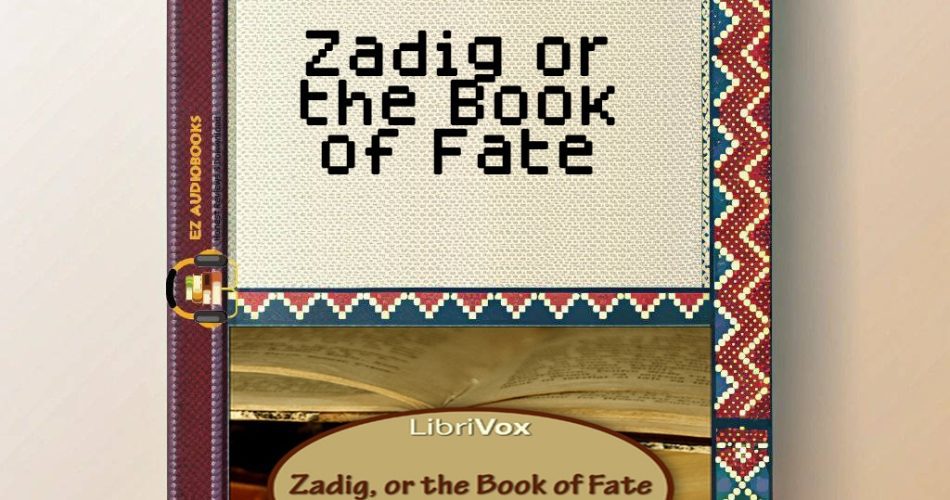Audiobook Sample
Listen to the sample to experience the story.
Please wait while we verify your browser...
- Title: Zadig or the Book of Fate
- Author: Voltaire
- Narrator: LibriVox Volunteers
- Length: 03:47:30
- Version: Abridged
- Release Date: 01/01/2015
- Publisher: LibriVox
- Genre: Fiction & Literature, Comedy, Satire & Parody, General
- ISBN13: SABLIB9786928
There’s something deliciously subversive about listening to 18th-century French philosophy while stuck in 21st-century traffic. As the LibriVox narrator’s voice filled my car during my last LA gridlock, Voltaire’s Babylonian fable became my perfect antidote to modern absurdity – proving some critiques are truly timeless.
“The Audio Experience: Community Voices Meet Classic Text”
The LibriVox volunteer narration gives this production a fascinating democratic quality – it’s like hearing the text filtered through a dozen different Enlightenment salons. While the audio quality varies slightly between chapters (as expected with volunteer recordings), there’s an authentic charm to these readings that perfectly suits Voltaire’s subversive spirit. I particularly enjoyed Chapter 7’s narrator who captured Zadig’s deadpan reactions to royal absurdity with perfect comic timing.
This experience reminded me of my BookTok series on audiobook adaptations – how different voices can reveal new dimensions in classic texts. One commenter brilliantly noted how the multiple narrators actually emphasize Zadig’s journey through different societal layers, something I’d missed in my college French lit readings.
“Voltaire’s Timeless Satire”
At its core, “Zadig” is a masterclass in using fiction as philosophical grenade launcher. Voltaire wraps his critiques of 18th-century France in Babylonian robes, but the targets – religious hypocrisy, corrupt justice systems, arbitrary power – feel painfully contemporary. Listening to Zadig’s misadventures, I kept thinking how these chapters could be republished today with only minor edits as commentary on our own societal madness.
The episodic structure works beautifully in audio format. Each chapter functions like a podcast episode – compact philosophical dilemmas wrapped in adventure. The ‘Missing Dog’ mystery (Chapter 3) particularly shines in audio, with Zadig’s logical deductions unfolding like an ancient Babylonian Sherlock Holmes episode.
“Cultural Resonance in Digital Age”
What struck me most during this listening experience was how Voltaire’s themes intersect with modern digital culture. Zadig’s struggle with ‘cancel culture’ avant la lettre (his poetic misinterpretations leading to exile) mirrors today’s social media outrage cycles. The arbitrary nature of Babylonian court politics? Just swap ‘king’ for ‘algorithm’ and you’ve got a biting commentary on platform governance.
This connection became especially clear when I used “Zadig” as a case study for my MIT digital media students. We compared Voltaire’s use of fictional settings to critique contemporary issues with how modern creators use fantasy/sci-fi allegories. The discussion got so lively we ended up creating a collaborative TikTok analyzing Zadig’s story through the lens of influencer culture – which, ironically, would probably have delighted the original social commentator himself.
“Philosophical Depth in Audio Form”
Hearing these philosophical arguments performed adds surprising emotional weight to Voltaire’s intellectual play. The famous ‘enigmas of life’ passage (Chapter 12) gains new poignancy when spoken aloud, the narrator’s slight tremble conveying the human frustration behind the polished prose. It’s moments like these that make me advocate for philosophical texts in audio format – there’s an intimacy to hearing these ideas voiced that silent reading can’t replicate.
“Comparative Analysis”
For listeners who enjoy:” Candide” (Voltaire’s more famous work), this offers a tighter, more focused philosophical journey. The narration style also provides an interesting contrast to professional productions – where polished single-narrator recordings create a cohesive world, this multi-voice approach emphasizes the text’s constructed, conversational nature, much like a podcast series might.
“Accessibility Notes”
As a free LibriVox production, this makes Enlightenment philosophy accessible to anyone with an internet connection – a democratization of knowledge that would have thrilled Voltaire himself. The lack of musical accompaniment or sound effects keeps focus squarely on the text, making it ideal for close listening during commutes or chores.
“Final Verdict”
This audiobook succeeds both as entertainment and intellectual provocation. While the audio quality isn’t studio-perfect, the raw, community-powered nature of the production adds its own layer of meaning to Voltaire’s text. For digital natives exploring philosophical classics, this free audiobook offers the perfect gateway – proof that 274 years after publication, Zadig’s questions about fate, justice and human nature still demand our attention.
Stay curious and keep questioning,
Sophie Bennett
(Drop me your hottest Enlightenment-era takes @DigitalSophie)

